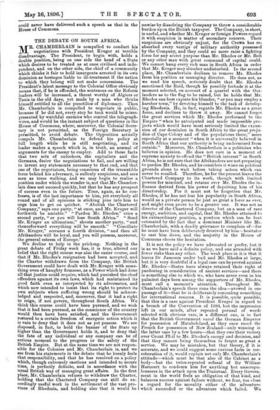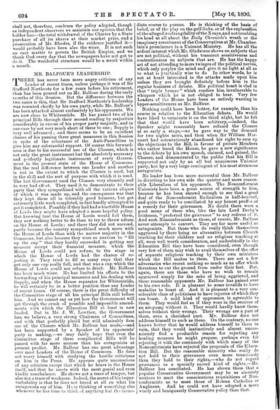THE DEBATE ON SOUTH AFRICA.
MR. CHAMBERLAIN is compelled to conduct his negotiations with President Kruger at terrible disadvantage. The President, to begin with, holds a double position, being on one side the head of a State which desires to be treated as at once civilised and inde- pendent, and on the other side, the chief of a community which thinks it fair to hold insurgents arrested in its own dominion as hostages liable to ill-treatment if the nation to which they belong will not make concessions. The President's latest message to the Colonial Office obviously means that, if he is offended, the sentences on the Reform leaders will be increased, a threat worthy of Algiers or Tunis in the old days, yet made by a man who thinks himself entitled to all the punctilios of diplomacy. Then Mr. Chamberlain is compelled to negotiate in public, because if he did not, every step he took would be misre- presented by watchful enemies who control the telegraph- wires, and would be the instant subject of questions in the House of Commons, where, moreover, the Colonial Secre- tary is not permitted, as the Foreign Secretary is permitted, to avoid debate. The Opposition actually compels Mr. Chamberlain to defend his policy at full length while he is still negotiating, and its leader makes a speech which is, in truth, an arsenal of arguments for the enemy to employ. Add to these facts that two sets of onlookers, the capitalists and the Germans, desire the negotiations to fail, and are willing to invent any statements necessary to that end, and that one of the negotiators, being conscious of the irresistible force behind his adversary, is sullenly suspicious, and sees men as trees walking, and we may begin to realise a position under which the wonder is, not that Mr. Chamber. lain does not succeed quickly, but that he has any prospect of success even in the future. Time, again, as he con- fesses, is of the last importance to him, yet everybody all round and of all opinions is sticking pins into him to urge him to get on quicker. " Abolish the Chartered Company," says one party, " at once, and Mr. Kruger will forthwith be amiable." " Pardon Mr. Rhodes," cries a second party, "or you will lose South Africa." " Send Mr. Kruger an ultimatum," shouts another party, " and thenceforward everything will be smooth." " Conciliate Mr. Kruger," screams a fourth division, " and then all Afrikanders will be loyal, and you will possess, moreover, the general esteem of Europe."
We decline to help in the pricking. Nothing in the great debate of Friday week has, it is true, altered our belief that the right course was also the easier course, and that if Mr. Rhcdes's resignation had been accepted, and the Charter withdrawn from the Company, the British Government could have dealt with Mr. Kruger with some- thing even of haughty firmness, as a Power which had done all that justice could require, which had punished the chief offenders against its own laws, which had maintained its good faith even as interpreted by its adversaries, and which now intended to insist that its right to protect its own subjects when suffering wrong should be acknow- ledged and respected, and, moreover, that it had a right to reign, if not govern, throughout South Africa. We think this course could have been pursued, and we wish that it had been pursued, as the conscience of the country would then have been satisfied, and the Government restored to a certain freedom of energetic action which it is vain to deny that it does not as yet possess. We are disposed, in fact, to hold the banner of the State up higher than the Government holds it, and to deny that the fate of any individual or any company can be of serious moment to the progress or the safety of the British Empire. But at the same time we are not respon- sible for the Colonies and Mr. Chamberlain is, and we see from his statements in the debate that he keenly feels that responsibility, and that he has resolved on a policy which, though extremely cautions and intended to secure time, is perfectly definite, and in accordance with the usual British way of managing great affairs. In the first place, Mr. Chamberlain refuses to withdraw the Charter, holding that the Chartered Company can still do ex- ceedingly useful work in the settlement of the vast pro- vince of Rhodesia, and holding also that it would be unwise by dissolving the Company to throw a considerable burden upon the British taxpayer. The Company, in short, is useful, and whether Mr. Kruger or foreign Powers regard it with suspicion is matter of secondary concern. Their suspicions are obviously unjust, for the Crown has re- absorbed every vestige of military authority possessed by the Company, and they could no more raise a fighting force for any secret purpose than Mr. Rhodes or Mr. Brit or any other man with great command of capital could. We cannot hang every rich man in South Africa in order that Mr. Kruger may slumber undisturbed. In the second place, Mr. Chamberlain declines to remove Mr. Rhodes from his position as managing director. He does not, as we read his speech, seriously doubt that Mr. Rhodes sanctioned the Raid, though he possibly forbade it at the moment selected, on account of a. quarrel with the Out- landers as to the flag to be raised, but he holds that Mr. Rhodes can best expiate his blunder, "or you may employ a harsher term," by devoting himself to the task of develop. ing Rhodesia. He, in fact, regards Mr. Rhodes as a great force, and declines to throw it away. He cannot forget the great services which Mr. Rhodes performed to the Empire " when be anticipated and made impossible pro- jects which would have most seriously limited the expan- sion of our dominion in South Africa to the great preju- dice of Cape Colony and of the populations there," more especially at a moment "when it is universally believed in South Africa that our authority is being undermined from outside." Moreover, Mr. Chamberlain is a politician who believes in opinion. He does not care in a moment of supreme anxiety to offend the "British interest" in South Africa, he is not sure that the Afrikanders are not preparing to pardon Mr. Rhodes, and he considers it wiser on political grounds alone to wait before taking action which can never be recalled. Therefore, he for the present leaves the Chartered Company to its work, though with limited powers for mischief, and retains over Mr. Rhodes the in- fluence derived from his power of depriving him of his directorship. For it must not be forgotten that Mr. Rhodes, if he has not lost his popularity in South Africa, would as a private person be just as great a force as ever, and might even prove to be a greater one. It was not as director of the Chartered Company, but as a man of rare energy, ambition, and capital, that Mr. Rhodes attained to his extraordinary position, a position which can be best estimated by the fact that a dominant Minister like Mt. Chamberlain, with a. deadly grievance to complain of—for he must have been deliberately deceived by him—hesitates to cast him down, and the majority in the House of Commons cheers the hesitation.
It is not the policy we have advocated or prefer, but it is as we have said a definite policy, and one attended with fewer risks than any other. The weak place in it is that it leaves Dr Jameson under bail and Mr. Rhodes at large, but it is very doubtful if a legal case can be proved against Mr. Rhodes—States have always retained their right of pardoning in consideration of ancient services—and there is something else to which wo, who have never even in his palmiest days been among the supporters of Mr. Rhodes, must call a moment's attention. Throughout Mr. Chamberlain's speech there runs the idea—avowed in one passage of it—that he is deliberately concealing something for international reasons. It is possible, quite possible, that this is a case against President Kruger in regard to a breach of the Convention of 1884, but the impression left in our minds, after repeated perusal of words selected with obvious care, is a different one, is in fact that the British Government raced the German Emperor for possession of Matabeleland, as they once raced the French for possession of New Zealand—only winning in the latter case by a few hours—that they owe their victory over Count Pfeil to Mr. Rhodes's energy and decision, and that they cannot bring themselves to forget so great a service. We may be mistaken, but that theory, if it is accurate, and we could suggest some curious facts in cor- roboration of it, would explain not only Mr. Chamberlain's attitude—which must be that also of the Cabinet as a body—but the twice-repeated refusal of Sir William Harcourt to condemn him for anything but unscrupu. lousness in the attack upon the Transvaal. Every Govern- ment in the world feels an obligation of that kind, and balances success against failure without, we fear, too close a regard for the morality either of the adventure which succeeded or the adventure which failed. We shall not, therefore, condemn the policy adopted, though as independent observers we maintain our opinion that the bolder line—the total withdrawal of the Charter by a State purchase of all its shares at their market price, and a prosecution of Mr. Rhodes, if the evidence justified it— would probably have been also the wiser. It is not such an easy matter to govern the British Empire, and we thank God every day that the newspapers have not got to do it. The wonderful structure would be a wreck within a month.







































 Previous page
Previous page